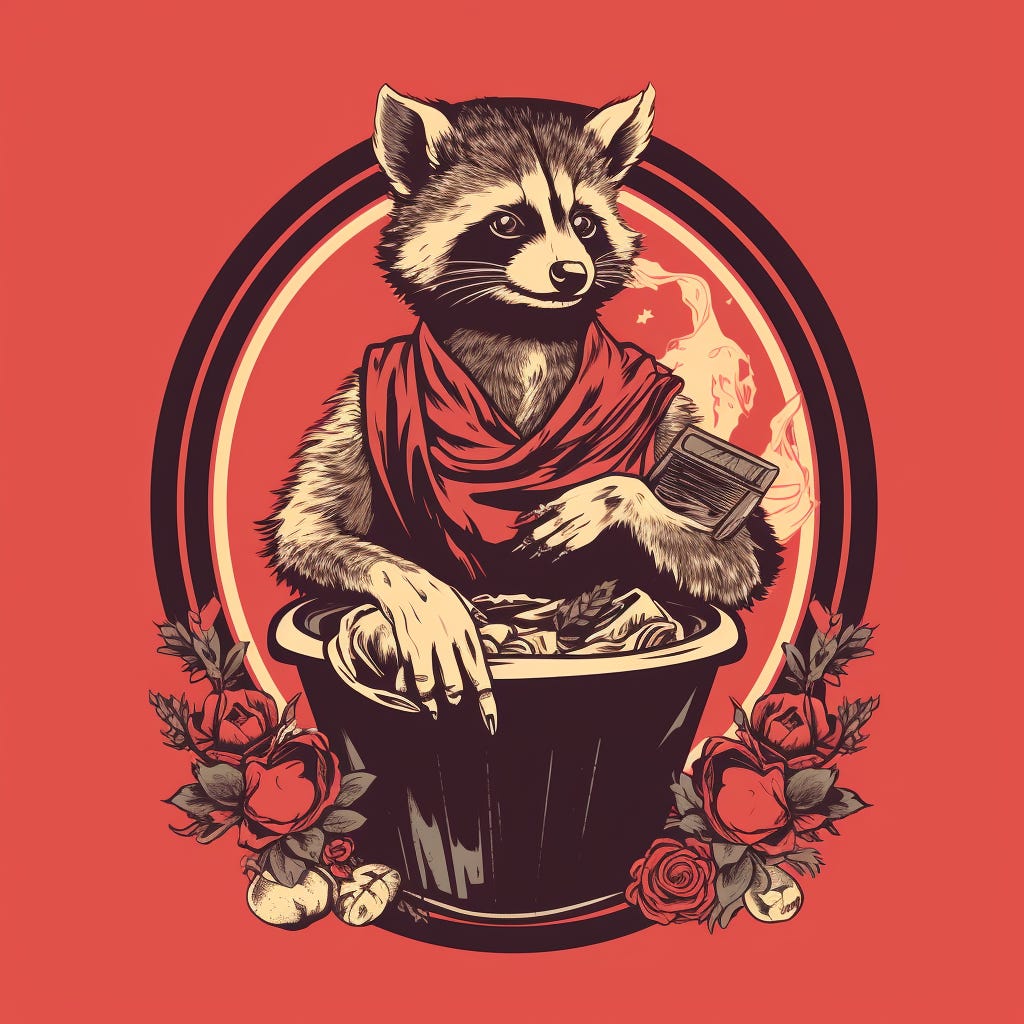Trash Panda Feminism Is A Dumpster Dive
This weekly publication offers critiques of feminism and disability, along with explorations of culture and the world we live in, with the intention of undermining systems of oppression through fun and educational essays.
That’s the fancy way of saying that Trash Panda Feminism covers feminism, disability issues, and North American culture through the eyes of a disabled, queer, feminist writer.
Here, we dig through things mainstream media, society, and modern corporate feminism have discarded, and we pull out the jewels of knowledge that will make the world we share a kinder, more egalitarian place to live.
Why The Name ‘Trash Panda Feminism’?
It started as a joke.
I had asked for names that would better fit the vibe of this newsletter, and
blurted out, “Trash Panda Feminism”.We laughed at the suggestion, but I loved the sound of the name, plus the connections my brain was making between this publication’s mission and the symbolism ‘Trash Panda Feminism’ evoked.
Glory later explained her reasoning to me, and it reinforced why Trash Panda Feminism fits perfectly.
Why Trash Pandas?
Raccoons are very North American, in part because raccoon coats were so popular in the late 19-teens to the early 1930’s.
Raccoon coats were so popular that people started breeding raccoons all over the US and parts of Canada.
When the Depression hit, the bottom dropped out on the raccoon fur coat market, in part because mostly men were wearing them.
So what did all these people do with the raccoons they were breeding?
They just released them. All over America. That’s why there are more raccoons in urban areas than outside urban areas, like where you would expect them to be—in the forest and stuff.
But essentially, raccoons—despite being abandoned—adapted very well to living in urban environments. They’ve adapted so well that they’ve become a serious problem in Toronto, where our mutual friend,
, lives with her dog, Roy. Roy keeps finding bread in the streets because the raccoons dig through the trash looking for delicious meats and things, and they throw the bread away because they think it’s trash.So Glory was thinking about how feminism today, especially the kind of feminism I write about, is like taking the discarded things in our culture—including disabled people and a lot of women’s issues—that are just tossed in the trash, and what we do here is we pull them out of the trash and say, “Ha! There may be treasure here. Let us discuss.”
Because at Trash Panda Feminism, we are not taking on the mainstream talking points. Mainstream feminism is very corporate, capitalistic, and determined by the wealthy who own the newspapers and other media outlets. They set the tone for what is considered “feminism”. And here at Trash Panda Feminism, we’re saying, “Yeah right, let’s go through what they’ve discarded because it has value.”
Who’s Behind Trash Panda Feminism?
Hi! My name is Megan McCarthy, and I am the writer behind Trash Panda Feminism.
I’m a multiply disabled (lupus, fibromyalgia, etc.), neurodivergent (ADHD, anxiety), LGBTQIA+ (Bi), feminist author from sunny SoCal.
When I'm not working on this newsletter or my fiction, you can find me streaming with friends, hanging out at the beach, or exploring all southern California has to offer.
Why subscribe?
Become a paid subscriber today
It’s important that Trash Panda Feminism be available to anyone who is curious. A lack of finances shouldn’t prohibit anyone from reading and learning. That’s why this newsletter will always be free.
Support Trash Panda Feminism by upgrading to a paid subscription. This will keep Trash Panda Feminism free while helping us grow.




